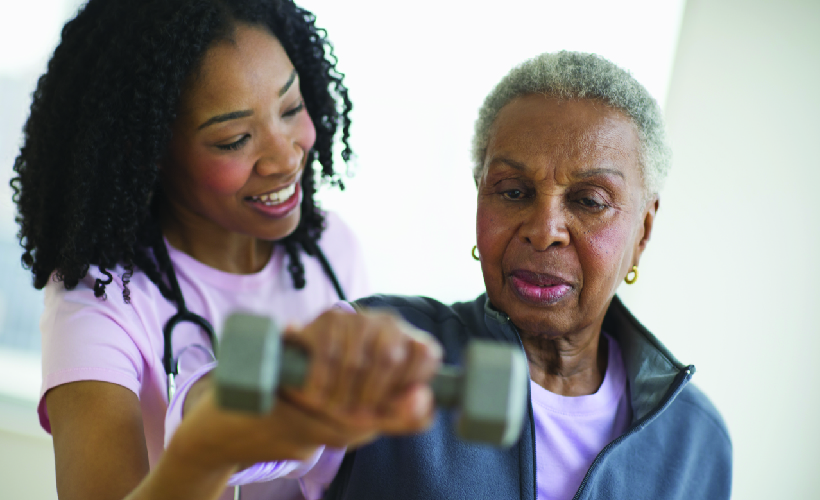Los enlaces a los sitios que no son de Aetna se brindan únicamente para su comodidad. Aetna Inc. y sus compañías afiliadas no son responsables del contenido, la precisión o las prácticas de privacidad de los sitios vinculados, ni de los productos o servicios descritos en dichos sitios.
El mejor alivio sin opioides para el dolor intenso

Most adults have experienced serious pain at some point in their lives. For some of you, managing pain may even be one of your primary health concerns. Long-term daily pain affects 25 million Americans, and 14.4 million people suffer from category 4 pain, the highest level. Pain can be disabling, affecting your ability to work, care for your family, manage other health conditions and enjoy life. So it’s no surprise that, when it comes to pain relief, sufferers want the best of the best.
Given all the headlines about opioids, you may believe they’re the strongest pain drugs available. And you’re likely concerned about taking something known to be highly addictive. But according to pain specialists, opioids are not a silver bullet for all kinds of pain. In fact, non-opioid alternatives can be even more effective.
El enfoque moderno de gestión de dolor a menudo consiste en una terapia de combinación que ataca desde diferentes ángulos. Esta es su guía a los mejores tratamientos no opioides durante cuatro causas comunes de dolor: procedimientos dentales, problemas de espalda baja, dolor en los nervios (neuropatía) y la migraña.
1. Analgésicos para extracción dental y cirugía oral.
Because dental pain is often caused by swelling and inflammation, anti-inflammatories are especially effective. Many patients find that ibuprofen, a non-steroidal anti-inflammatory (NSAID), is all they need. In cases where ibuprofen alone is not enough, studies show that a combination of ibuprofen (Advil, Motrin) and acetaminophen (Tylenol) actually works better than opioids following dental surgery.
Another option to discuss with your dentist is Exparel, an injection that numbs the area being worked on. Unlike other local anesthetics, Exparel continues to suppress pain for up to 72 hours. Aetna is the first and only dental insurer to cover Exparel for wisdom tooth extractions and other common surgeries, including hernia and breast cancer.
2. Treatments for lower back pain.
For chronic pain, it’s important to address the root cause as well as the role stress plays in magnifying pain. People with lower-back problems, for instance, benefit most from a treatment plan that includes medication plus physical therapy, acupuncture and/or cognitive behavioral therapy.
Research shows that opioids, though effective at blocking short-term pain signals, don’t offer much help for people with chronic pain. That’s because opioids become less effective the longer you take them.
3. Easing pain from neuropathy.
Los pacientes con ciertas condiciones de salud - diabetes, esclerosis múltiple, fibromialgia, tejas - pueden sufrir de un tipo de dolor de los nervios llamada neuropatía periférica. En estos casos, el exceso de medicamentos de venta libre y los enfoques no farmacológicos (masajes, suplementos dietéticos) se pueden combinar con los antidepresivos. Eso no significa que el dolor es todo en su cabeza. Los antidepresivos trabajan en una serie de neurotransmisores (mensajeros químicos utilizados por el sistema nervioso) que pueden estar implicados en el dolor.
4. Migraine prevention and relief.
Migraine is more than a headache. It’s often accompanied by nausea, dizziness and vision problems. The cause is unknown, but some experts believe it’s a genetic disorder of the central nervous system that may be related to epilepsy. Doctors typically recommend triptans, a medication that works on serotonin receptors, and NSAIDs. Frequent migraine may call for preventive measures, such as dietary changes, blood pressure medication or anti-seizure drugs.
Although opioids do block migraine pain, they can also lead to more severe and frequent headaches. It’s easy to see how that can become a vicious cycle.
For some people, opioids are essential medicines. They provide better quality of life for patients with acute severe pain, cancer pain or pain at end-of-life. We don’t want to take opioids away from people who really need them. At the same time, opioids are routinely overprescribed for conditions they were not intended to treat.
If you experience chronic pain or have a surgical procedure in your future, have a conversation with your primary doctor or a pain specialist. In the event your doctor or dentist offers to prescribe opioids, let them know you’re open to non-opioid treatments. Aetna’s Find a Doctor tool allows members and nonmembers to search for surgeons that offer non-opioid pain relief options.
You may be pleasantly surprised by just how effective non-opioids can be.
Avisos legales
“Aetna” es el nombre comercial que se utiliza en los productos y servicios ofrecidos por una o más de las compañías del grupo Aetna, entre las que se incluyen Aetna Life Insurance Company y sus filiales (denominadas “Aetna”).
Los planes de beneficios y de seguro de salud tienen exclusiones y limitaciones.